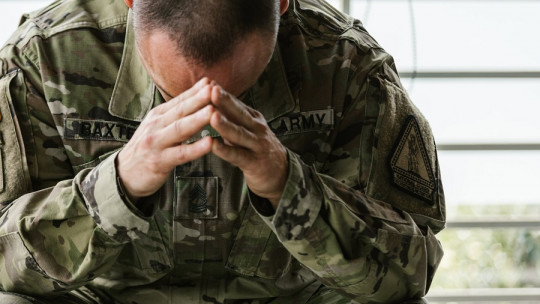When experiencing a traumatic event such as a car accident, we can experience various physical injuries that require hospitalization. Once the body is recovered, fear, discomfort, anguish and uncertainty about the future may still persist. Although traumatic situations can arise at any time in life and under very diverse circumstances, their effect is reflected in what we feel, observe and perceive about the environment. However, how can we detect these situations? Does this happen in the same way in all human beings? Why do we react this way to these events?
In this PsychologyFor article we will show you which are the main consequences of post-traumatic stress.
What is PTSD
Post-traumatic stress disorder is a mental pathology that is characterized by the presence of prolonged discomfort after a traumatic event. This clinical condition is considered by the DSM-V(1) according to some qualities that represent it.
The diagnostic criteria and symptoms that must be met to establish an adequate diagnosis are:
- Real or imagined exposure to life-threatening danger through the form of sexual violence or serious injuries
- Cognitive alterations.
- Duration of a month or more.
- The alterations cause a deterioration of work, social and family relationships.
- The deterioration cannot be explained by the presence of another mental disorder and/or the ingestion of toxic substances or medications.
Symptoms of post-traumatic stress
How does a person with post-traumatic stress behave? Taking into consideration the aforementioned particularities, it is possible to point out a series of characteristic symptoms of this pathology:
- Prolonged discomfort.
- intrusive thoughts about the traumatic event.
- Avoidance of related stimuli.
- Difficulty remembering situations.
- Low self-esteem.
- Altered perception of reality.
- Lack of interest in activities.
- Concentration problems.

Depression
The presence of constant states of alert and fear can cause serious depressive symptoms. In these cases, there is a unwillingness to carry out daily activities and resume interests that were present in the moments before the traumatic event.
Although each depressive condition has specific variables depending on each person, the intensity of the pathology must be taken into account. In certain cases, the provision of psychiatric medication may be necessary. In the following article you will find What is the profile of a depressed person.
Sleep disturbances
One of the consequences that can occur in people who have experienced traumatic situations are alterations in sleep patterns. Generally speaking, they occur as a result of deregulations in the central nervous system.
In some cases, people develop insomnia due to states of constant hypervigilance. In other words, the person appears to have difficulty sleeping due to a predominance of nervousness. Other people have hypersomnia as a result of an inability to face moments of daily life. Although it is necessary to study specific cases, it could be thought that it is a defense mechanism provided by the mind.
Suicidal ideas
This is one of the indicators that should be a reason for admission to mental health centers, the creation of therapeutic spaces and a family support network. Another consequence that could arise after exposure to traumatic events is appearance of recurrent suicidal thoughts.
In many cases, low self-esteem and the unwillingness to face unfinished projects produce these types of thoughts. When this occurs, it is necessary to act urgently due to the risk of death that could be involved.

Social anxiety
Another of the main consequences that can arise from post-traumatic stress is social anxiety, a symptom that can dominate a person’s life. In this sense, the search for quick and effective solutions can lead the person to act impulsively in specific moments, so in these cases it becomes necessary to be alert.
In this article you will find more information about Social Anxiety Disorder: what it is, symptoms, causes and treatment.
Eating disorders
In some cases, people who have gone through difficult times may suffer from severe eating disorders that could pose some risk for the life of the person. On the one hand, there is an abrupt loss of appetite and a marked decrease in body weight that triggers serious problems in carrying out daily activities.
On the other hand, the need to eat excessively may arise. This can cause health complications such as obesity, cholesterol or diabetes, among others.
Nightmares
Finally, people who have been diagnosed with post-traumatic stress disorder may develop nightmares. In general terms, the dreams reported by affected patients are usually related to or persistently recall the situation that occurred. For this reason, it is common to hear what they have dreamed in relation to the traumatic event on repeated occasions.
Other effects that manifest in the body in these cases are shortness of breath, confusion, imbalance, among others.

This article is merely informative, at PsychologyFor we do not have the power to make a diagnosis or recommend a treatment. We invite you to go to a psychologist to treat your particular case.
If you want to read more articles similar to Sequelae of post-traumatic stress we recommend that you enter our Clinical Psychology category.
- American Psychiatric Association (2013). Diagnostic and Statistical Manual of mental disorders (5th edition). Arlington: Panamericana Medical Publishing.
Bibliography
- Carvajal, C. (2002). Posttraumatic stress disorder: clinical aspects. Chilean Journal of Neuro-psychiatry, 40 (2), 20-34.









